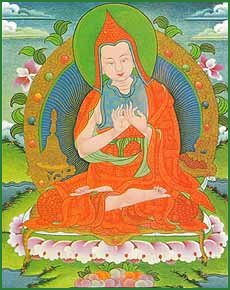The Great Chariot
by Longchenpa | 268,580 words
A Commentary on Great Perfection: The Nature of Mind, Easer of Weariness In Sanskrit the title is ‘Mahāsandhi-cittā-visranta-vṛtti-mahāratha-nāma’. In Tibetan ‘rDzogs pa chen po sems nyid ngal gso’i shing rta chen po shes bya ba ’...
Part 5 - Teaching impermanence through teaching how the victorious ones and their sons attain nirvana
Even the teachers who come into these worlds, the many tathaagatas and their retinues, go beyond suffering to nirvaana. In considering how their teaching declines, there is the further teaching that our own lives are impermanent:
Even the host of world leaders, those self-enlightened students,
The noble Lords of Sages, surrounded by their sons,
Like moons within a clear sky that formerly were not there
Encircled by attending garlands of stars and planets;
Though they may shine with brilliance in luminosity,
They also teach impermanence by passing into nirvana.See too how the measureless sun that is the precious teachings
Sets ever more from generation to generation.
Then why should our bodies, like plantain trees without a heart,
Or like a phantom castle, fail to be destroyed?
Teachers came to this World of Fortitude. Their forms were seen. Vipashyii, Ratnachaada, Vishvabhu, Krakucchanda, Karakamuni, Dipamkara, and Shaakyamuni, like the full moon rising on an autumn evening, blazed with the brilliance of the major and minor marks. They came as if surrounded by hosts of stars as their retinues, shraavakas, bodhisattvas, Bhrama, the world protector deities, and so on. Their bodies blazed with splendor. Their speech was brilliant, and without meaningless chatter. Their spotless minds shone forth with their illumination. They were as firm as vajra, having passed beyond suffering.
Other teachers, gradually declining, depended on the supreme being of the Shaakyas. If all of them were impermanent, how will my body, as insubstantial as a bubble, not be impermanent. The Collection of Impermanence says:
Ablaze with a thousand marks is the body of sugatagarbha.[1]
If this is impermanent, established with merit a hundred times over,
Then, as unreliable as a breaking bubble,
How can, this, my body, not certainly be destroyed?The helper of beings, the Conqueror, who is like the sun,
And the moon, the treasure of holy Dharma, are seen to set.
As for our goods, our retinues, and our enjoyments,
We should certainly know that they are impermanent.
Footnotes and references:
[1]:
